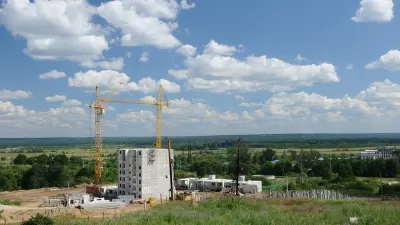Through determined investment, L.A. is on track to generate a third of its power from renewables by 2020. Varun Sivaram, formerly Mayor Villaraigosa's senior advisor on energy and water policy, explains how the city must modernize its power system.
Through determined investment in solar energy, Los Angeles is on track to generate a third of its power from renewables by 2020. Varun Sivaram, formerly Mayor Antonio Villaraigosa's senior advisor on energy and water policy and currently a Rhodes Scholar at Oxford, penned the following op-ed for The Planning Report on the challenges Los Angeles faces in upgrading its energy infrastructure while meeting demand for renewables.
The Los Angeles Department of Water and Power serves over four million people, making it the largest municipal utility in the United States. California's Renewable Portfolio Standard requires investor-owned utilities, electric service providers, and community choice aggregators to increase procurement from eligible renewable energy resources to 33 percent of total procurement by 2020. The mandate is a challenge to utilities like the LADWP, which have struggled to end contracts with energy providers in order to meet the standard. And while the utility is on track to replace 70 percent of its power supply in a decade, Sivaram urges Mayor Eric Garcetti to "seek new ways to supply, store, and save energy to arrest both electricity rates and greenhouse gas emissions."
FULL STORY: Varun Sivaram on Powering LA City’s Future

Planetizen Federal Action Tracker
A weekly monitor of how Trump’s orders and actions are impacting planners and planning in America.

Maui's Vacation Rental Debate Turns Ugly
Verbal attacks, misinformation campaigns and fistfights plague a high-stakes debate to convert thousands of vacation rentals into long-term housing.

Restaurant Patios Were a Pandemic Win — Why Were They so Hard to Keep?
Social distancing requirements and changes in travel patterns prompted cities to pilot new uses for street and sidewalk space. Then it got complicated.

In California Battle of Housing vs. Environment, Housing Just Won
A new state law significantly limits the power of CEQA, an environmental review law that served as a powerful tool for blocking new development.

Boulder Eliminates Parking Minimums Citywide
Officials estimate the cost of building a single underground parking space at up to $100,000.

Orange County, Florida Adopts Largest US “Sprawl Repair” Code
The ‘Orange Code’ seeks to rectify decades of sprawl-inducing, car-oriented development.
Urban Design for Planners 1: Software Tools
This six-course series explores essential urban design concepts using open source software and equips planners with the tools they need to participate fully in the urban design process.
Planning for Universal Design
Learn the tools for implementing Universal Design in planning regulations.
Heyer Gruel & Associates PA
JM Goldson LLC
Custer County Colorado
City of Camden Redevelopment Agency
City of Astoria
Transportation Research & Education Center (TREC) at Portland State University
Jefferson Parish Government
Camden Redevelopment Agency
City of Claremont



























